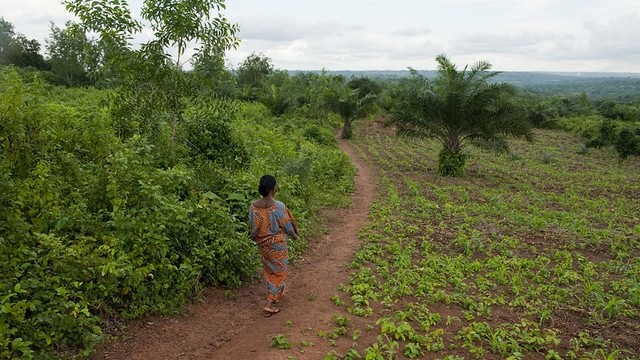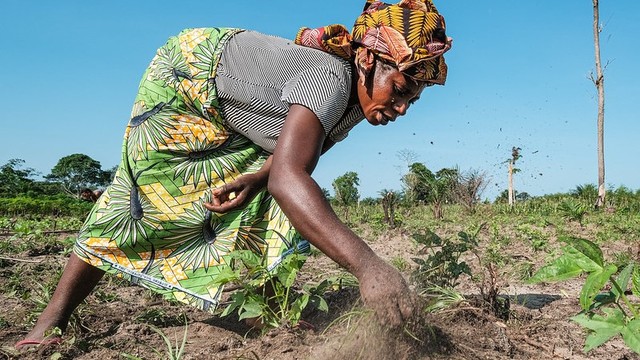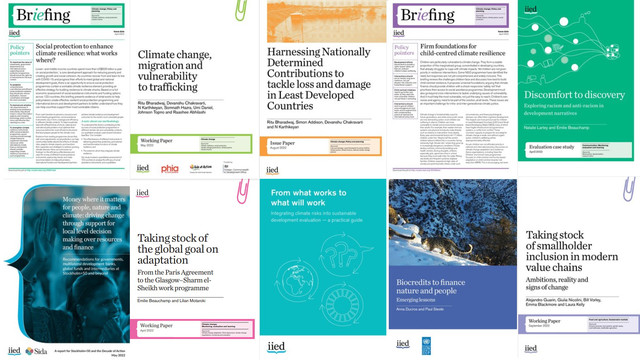12 Christmas crackers from IIED

Members of the Zimbabwe Homeless People's Federation learn techniques for building houses on land that is affected by climate-related hazards, including waterlogging (Photo: David Dodman)
1. Climate change impacts, vulnerability and adaptation in Zimbabwe
This report says Zimbabwe's climate change strategy should focus more on urban communities, give a greater role to civil society participation, and learn lessons from other highly vulnerable nations. Download the report, a four-page briefing paper or read the press release.
2. Urban poverty, food security and climate change
This report says policies to increase food security in the global South focus too much on rural food production and not enough on ensuring poor people can access and afford food, especially in urban areas. It warns that climate change will only make this policy gap worse, because climate change impacts will affect not only harvests but also the systems that people use to transport, store and buy and sell food. Download the report, a four-page briefing paper or read the press release.
3. Counting the costs: replacing pastoralism with irrigated agriculture in the Awash Valley, Ethiopia
This paper quantifies the economic benefits generated by three alternative agricultural systems – pastoral livestock production versus cotton and sugar cane estates. Some would argue that the results of this comparison are a foregone conclusion. Pastoralism is often viewed as a primitive, unproductive way of life – an economic dead end that poses no credible alternative to modern, technologically advanced and input-dependent forms of irrigated agriculture. The results presented in this paper call these presumptions into question. Download the report.
4. 'Post-2015' international development goals: Who wants what and why
2015 will be a watershed year for international development, when the Millennium Development Goal (MDG) framework will be revised, extended or replaced. Is inequality a pivotal issue for global development goals? Can the 'post 2015 agenda' simultaneously support action on poverty reduction, environmental health and economic growth? How can the next set of goals replicate the simplicity of the MDGs, yet be more flexible to national conditions and to emerging issues? This paper identifies some of the players, their propositions and the emerging 'fault lines'. Download the report or read the blog post by researcher Emily Benson.
5. An operational framework for tracking adaptation and measuring development
This report describes a new framework and tools that IIED and partners have developed to enable governments and development agencies to assess whether climate change adaptation projects enhance or compromise development. They measure how fairly the costs and benefits of such projects are distributed, and help to identify where to spend future investments. IIED is working with the governments of Ghana, Kenya, Mozambique, Nepal, and Pakistan to test the framework and tools as means to evaluate a range of climate adaptation activities. Download the report or read the press release.
6. Dispute or Dialogue? Community perspectives on company-led grievance mechanisms
This book shows that giant mining, timber, and oil and gas projects provide lessons in how companies can act to address conflict and build trust in communities their activities affect. It includes research from Africa, Asia, the Russian Far East and Azerbaijan that provides insights into how different grievance mechanisms are designed and what affected communities think about them. Download the report or read the press release.
7. Demand-side interventions to reduce deforestation and forest degradation
This paper examines whether demand side measures — such as legislation, public procurement policies, voluntary bilateral arrangements, multi-stakeholder roundtables, independent certification, moratoria, investor activism and consumer campaigns – can reduce incentives for deforestation. It focuses on five types of 'forest risk commodity' that drive deforestation, namely timber, soy, palm oil, beef/leather and biofuels. Download the report, read the IIED blog post by researcher Simon Milledge or read his blog post for The Guardian.
8. Responding to the challenge of artisanal and small-scale mining
Small-scale and artisanal mining — a sector that governments and development agencies often see as only as a problem — could be a source of sustainable livelihoods for millions of marginalised people, according to this report, which identifies knowledge gaps in the sector. Download the report, read the press release or read a blog post for The Guardian by researcher Sarah Best.
9. Accountability in Africa's land rush: what role for legal empowerment
This report – co-produced with IDRC – analyses legal frameworks in 12 African countries and reviews the cases of 16 large scale land deals. It examines the accountability of public authorities that preside over land deals in Africa and asks whether legal empowerment offers citizens scope to expect fairer outcomes. It shows that people who feel wronged by large scale land deals in are taking a variety of steps to seek justice. Download the report or read the press release.
10. Tools for supporting sustainable natural resource management and livelihoods
This 66th issue of Participatory Learning and Action explores the links between participation, sustainable natural resource management and improving livelihoods. It includes articles on how digital mapping is helping pastoralists in Kenya and Tanzania to manage natural resources, how former bonded labours in Nepal have campaigned to uphold rights to access, use and control community forests, and how a participatory three-dimensional modelling project in the Solomon Islands has generated multiple benefits, including ecosystem-based adaptation to climate change. Download PLA66.
11. Media perceptions and portrayals of pastoralists in Kenya, India and China
This report is one in a series from a project that shows that partial narratives that underpin policymaking prevent people in arid regions from fulfilling their potential to provide food and sustain resilient livelihoods in a changing climate. This part of the project showed how media coverage of pastoralism contributes to these partial narratives and suggests ways for media outlets to improve their reporting. Download the report or the four-page briefing paper, or read the press release.
12. Learning from 20 years of payments for ecosystem services in Costa Rica
The report tells the story of how Costa Rica's 'payments for ecosystem services' (PES) programme developed in its quest to balance equity, effectiveness and low implementation costs. The report shares the country's experiment in adapting PES characteristics to 'fit' the international forest conservation agenda, as well as the realities of Costa Rica's landscape and people, and a mix of policies all playing out at once. Download the report or read the associated blog post by David N. Barton.



